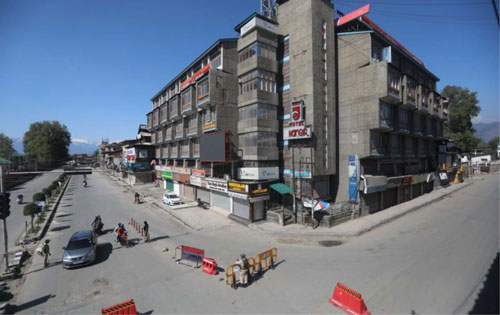On July 11, authorities in Kashmir sacked eleven government employees including a female teacher invoking Article 311 of the Constitution of India.
The Article deals with the dismissal, removal, or reduction in rank of a government employee. This provision is generally construed to be a safeguard in the interest of employees; however in Kashmir it has found a different use.
Clause 2 of this Article mandates that no em-ployee shall be dismissed, removed, or reduced in rank prior to a proper enquiry against the charges made against him.
This also obligates the authority in charge of the removal to give a reasonable oppor-tunity of being heard to the accused, and inform them of the grounds of their dismissal.
However, a proviso is added to these clauses, which specifies three situations where such funda-mental procedures can be bypassed.
The third situa-tion, which is being invoked to dismiss employees in Kashmir, is enshrined in sub-clause (c) in the proviso which reads: “Where the President or the Governor, as the case may be, is satisfied that in the interest of the security of the State, it is not expedi-ent to hold such inquiry”.
Authorities in Kashmir are now invoking sub-clause (c) of the article to dismiss or sack employ-ees, giving reason of ‘in the interest of the security of the state’.
A female teacher, Razia Akhtar, was among the eleven employees who were recently sacked by the J-K’s Lieutenant Governor Manoj Sinha without publicly revealing the allegations leveled against them.
According to media reports, Akhtar, a resident of south Kashmir’s Anantnag district, was working in J-K’s Education Department as a teacher before her dismissal.
“She was involved in subversive ac-tivities which pose threat to the security and law and order,” the official line has held.
The list also includes Syed Ahmad Shakeel and Shahid Yousuf, sons of the Hizbul Mujahideen su-premo Syed Salahuddin, who have been accused of involvement in terror funding, and two policemen who were allegedly abetting militant activities.
A junior-level employee of J-K’s health depart-ment, an inspector in the power department, and two more teachers were on the list of those dismissed from service.
Officials said four among the eleven targeted employees hail from south Kashmir’s Anantnag district while three are from Budgam and one each from Baramulla, Srinagar, Pulwama and Kupwara districts.
Akhtar is daughter of Mohammad Sultan, who as per the reports had been a member of Jamaat-e-Islami.
He was reportedly killed by Ikhwanis, the dreaded militiamen who unleashed terror on locals in the valley during the 1990s when armed insur-gency was at its peak. Her dismissal was approved by the LG this month.
Earlier this year, seven employees, including a college professor and a middle-rung police officer, were dismissed from the services under the same provision.
The Article was not applicable to Jammu and Kashmir until the Indian government revoked Article 370 in early August 2019 and a new set of laws was introduced.
However, there was a similar section in the con-stitution of the erstwhile state of Jammu and Kash-mir dealing with the conduct of the government employees.
Earlier in 2016, during the tenure of the PDP-BJP coalition government, twelve employees were terminated from the services invoking Section 126 of the constitution of Jammu and Kashmir.
In late April this year, the government created a Special Task Force (STF) to identify and scrutinize the government employees involved in anti-national activities. The STF is mandated to monitor the so-cial media accounts of government employees.
Also, authorities amended the Civil Services In-structions (1997) which made a satisfactory verifi-cation report from investigative agencies necessary for the job seekers.
Political analysts in the valley say these moves are aimed to send a message across the rank and file of government employees and also to those who endeavor to get government jobs in the future.
They feel that sacking government employees in this manner would deter government employees in the valley from affiliating with any political, social or religious organization.
Legal experts have also flagged concerns about the limited judicial relief that the sacked employees can avail.
When the authorities invoke sub-clause (c) of Article 311, authorities are not required to record the reasons for dismissal thereby relegating the chances of getting justice from the court of law.
It now remains to be seen whether the state will be able to deter people from living lives without affiliations.
The fact is that the move has already sent shock waves among the aspirants wishing to serve the government.
Not only that, it has also garnered widespread criticism from the Kashmir populace on social me-dia who see it as a ploy to demotivate the youth, who by and large are inclined towards the ideology that is abhorred by the state,
“The removing of govt employees merely for their ideology is a clear ploy to further provoke Kashmiris and alienate them even more,” wrote a social media user.
Another said that the measure would mean an end for those wishing to live normal lives. “What was the need to dismiss Salahudin’s son, he is not a militant, his father is.
It sends a message to the youth that if their parents have committed any mis-take, they have no option but to follow that mistake, they can’t live normally, thanks to the policies of the government.”
Although in the past the successive governments – both at the center and the state level – have brought in measures to rehabilitate militants and their families after they have shunned the gun. The current move will now lead to skepticism among such people and families.
—Courtesy: The Kashmir Walla









